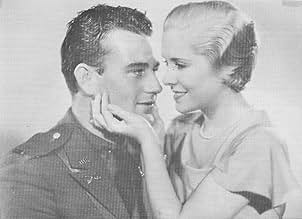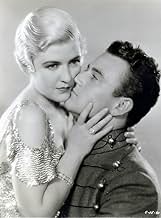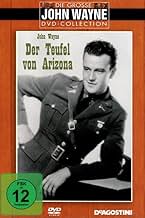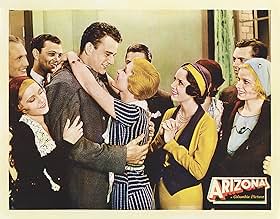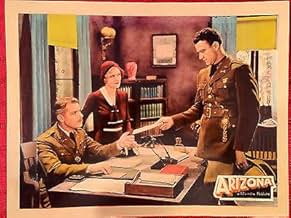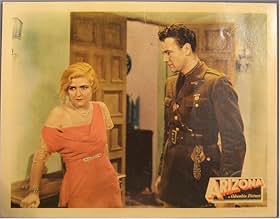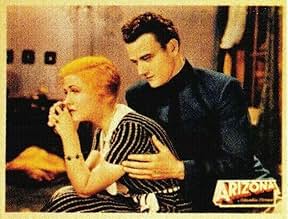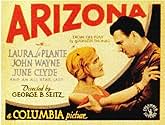Adicionar um enredo no seu idiomaBob refuses to marry his girlfriend and leaves her. She marries his close friend out of revenge.Bob refuses to marry his girlfriend and leaves her. She marries his close friend out of revenge.Bob refuses to marry his girlfriend and leaves her. She marries his close friend out of revenge.
- Direção
- Roteiristas
- Artistas
Nina Quartero
- Conchita
- (as Nena Quartaro)
Jack Cheatham
- Army Football Coach
- (não creditado)
Hugh Cummings
- Hank
- (não creditado)
Susan Fleming
- Dot
- (não creditado)
Geneva Mitchell
- Auctioneer
- (não creditado)
Adrian Morris
- Officer
- (não creditado)
Loretta Sayers
- Peggy
- (não creditado)
Charles Sellon
- Officer
- (não creditado)
- Direção
- Roteiristas
- Elenco e equipe completos
- Produção, bilheteria e muito mais no IMDbPro
Avaliações em destaque
A very solid good picture from 1931 is finally seeing the light of day via the new TV channel, GET/TV. We watched it last night.
First of all you need to know the picture and sound of this 83 year old film is much better than might be expected. Perhaps withheld because of long term friction between Columbia Pictures and John Wayne.
Set in West Point and later in Arizona, Wayne plays a football hero who finds it necessary to break up with a girl he realizes he doesn't love. He soon finds out she's the b...h from hell, and her reaction will impact on several other people.
The script and acting is just fine.
First of all you need to know the picture and sound of this 83 year old film is much better than might be expected. Perhaps withheld because of long term friction between Columbia Pictures and John Wayne.
Set in West Point and later in Arizona, Wayne plays a football hero who finds it necessary to break up with a girl he realizes he doesn't love. He soon finds out she's the b...h from hell, and her reaction will impact on several other people.
The script and acting is just fine.
I suppose that on the plus side for John Wayne in this film he got to put on a football jersey which up until recently he had been wearing for the University of Southern California. Here he plays a cadet who kicks the winning field goal in the Army/Navy game before graduating West Point.
The Duke is the foster son of Colonel Forrest Stanley and after graduation he's been assigned out in Arizona to the army post that Stanley is commandant of. Before leaving he rather callously gives the air to Laura LaPlante who he'd been seeing. Laura doesn't take the breakup well and without Wayne knowing it, makes a play for Stanley who she marries. She's out living in Arizona with Stanley and her sister June Clyde before Wayne arrives at the post.
John Wayne fans should realize that this is not the Duke they're accustomed to. He's playing the kind of hero/heel part that Tyrone Power later perfected so well. It doesn't wear well on Wayne at all.
In fact as I watched Arizona and did a little research on it, I saw that it was remake of a silent film of the same name that starred that greatest of swashbucklers Douglas Fairbanks. No wonder I thought that this was a film better played by someone like Tyrone Power.
In the Citadel Film Series book, The Films of John Wayne, Arizona is listed under its later title of Men Are Like That. My guess is that the title was changed to not confuse viewers with the later Jean Arthur William Holden western Arizona. Of course the title need not have been changed at all, but I suspect this Arizona was re-released to take advantage of John Wayne's burst into major stardom following Stagecoach. Harry Cohn could do little else because John Wayne was pointedly not working for Columbia Pictures after Cohn fired him and later tried to blackball him in the industry. There was never any new Duke product for Columbia after Wayne became a legend.
Probably only the Duke's most devoted fans would want to see Arizona.
The Duke is the foster son of Colonel Forrest Stanley and after graduation he's been assigned out in Arizona to the army post that Stanley is commandant of. Before leaving he rather callously gives the air to Laura LaPlante who he'd been seeing. Laura doesn't take the breakup well and without Wayne knowing it, makes a play for Stanley who she marries. She's out living in Arizona with Stanley and her sister June Clyde before Wayne arrives at the post.
John Wayne fans should realize that this is not the Duke they're accustomed to. He's playing the kind of hero/heel part that Tyrone Power later perfected so well. It doesn't wear well on Wayne at all.
In fact as I watched Arizona and did a little research on it, I saw that it was remake of a silent film of the same name that starred that greatest of swashbucklers Douglas Fairbanks. No wonder I thought that this was a film better played by someone like Tyrone Power.
In the Citadel Film Series book, The Films of John Wayne, Arizona is listed under its later title of Men Are Like That. My guess is that the title was changed to not confuse viewers with the later Jean Arthur William Holden western Arizona. Of course the title need not have been changed at all, but I suspect this Arizona was re-released to take advantage of John Wayne's burst into major stardom following Stagecoach. Harry Cohn could do little else because John Wayne was pointedly not working for Columbia Pictures after Cohn fired him and later tried to blackball him in the industry. There was never any new Duke product for Columbia after Wayne became a legend.
Probably only the Duke's most devoted fans would want to see Arizona.
Certainly not one of John Wayne's worst films, as one reviewer proclaims, but among his worst performances. After his initial starring role in "The Big Trail" in 1930, Wayne found himself at Columbia and turned in this wooden acting role in "Arizona" along with other pictures and was eventually fired by Harry Cohn. Soon Wayne found himself on poverty row, starring in "His Private Secretary" for Showmen's Pictures in 1933 and a series of westerns for Lone Star Productions released by Monogram Pictures in 1934. His climb back to being a top Hollywood star would take a few years. This film is a cultural significance since it has been released on a DVD set entitled "Columbia Pictures - Pre-Code Collection" along with four other films made in 1931-1932, starring Barbara Stanwyck, Jean Harlow, and Carole Lombard.
This could have been rather more than this simple melodrama, had Messrs. Seitz and Riskin been a bit more adventurous with their adaptation of quite a fun play. It centres around "Evelyn" (Laura la Plante) who is jilted by her beau, and so, reluctantly, marries "Col. Bonham" (Forrest Stanley) on the rebound. They relocate to his command in Arizona where they are soon joined by the colonel's handsome, football-star protegé "Bob Denton" (John Wayne) who, guess what - turns out to be the one who jilted her, and who now starts to take a bit of a shine to her younger sister "Bonnie" (June Clyde). Well, "Evelyn" is having none of this and sets up an elaborate plan to save her sister and disgrace poor old "Bob". This story is a bit thin, as are the performances - but it isn't hard to see why the dashing Wayne was drawing in the crowds - wooden as he is, he has charisma here in spades and plays well against the vengeful character and much more accomplished actress that is La Plante. This is really little more than a film for Wayne fans to tick off a list of his early works - not terrible, but not really anything much at all...
An American drama; A story about an American army lieutenant whose former girlfriend marries his commanding officer out of revenge causing complications down the line. This pre-code melodrama is a stagebound production about false accusation and romantic shenanigans. It contrives a plot about a mix-up but it contains holes at almost every turn, never really generating any suspense. The main characters are written as scoundrels without many redeeming features and it is too silly to be moving. June Clyde is likeable as the excitable younger sister full of energy and life. John Wayne wilts despite his alacrity.
Você sabia?
- CuriosidadesThe film is known as "MEN ARE LIKE THAT" when it was shown (and advertised) in major, first-run release in New York City, yet somehow it is re titled "ARIZONA" almost immediately afterward. (New York Sun, 14 August 1931)
Principais escolhas
Faça login para avaliar e ver a lista de recomendações personalizadas
Detalhes
- Tempo de duração
- 1 h 10 min(70 min)
- Cor
Contribua para esta página
Sugerir uma alteração ou adicionar conteúdo ausente

